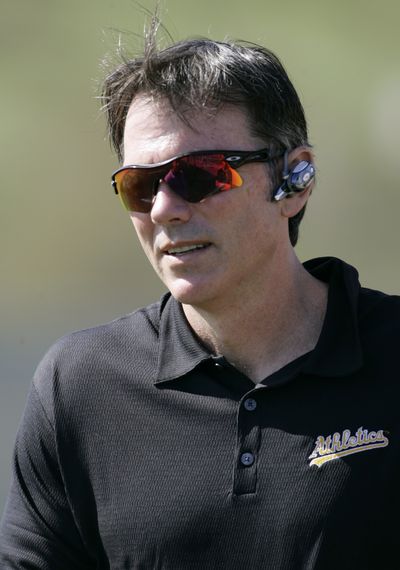A’s Beane proud of the ‘Moneyball’ legacy

VILLANOVA, Pa. – Billy Beane’s influence on using baseball statistics and economics in building a team has stretched from the diamond to the silver screen.
He may even help Brad Pitt win an Oscar before he leads the Oakland Athletics to a World Series championship.
For Beane, though, the “Moneyball” idea of building winners means more than an association with the A’s and A-list stars. It’s the idea that thinking outside the box – or box score – in any business can not only shake up the status quo, but lead to breakthrough ideas that can revolutionize industries.
A panel on Friday at Villanova University that included Beane, CEO Jeffrey Moorad and senior vice president of baseball operations Omar Minaya of the San Diego Padres, and MSNBC president Phil Griffin discussed “Moneyball’s Impact on Business and Sports.”
“It’s great; it’s flattering to see the business world embrace some of the things that we were doing,” Beane said. “But to know that anyone can walk into our office and apply for a job based on their brains and what they have to offer, to me, it’s the greatest achievement out of the book.”
Former Gov. Ed Rendell moderated the panel in front of about 1,800 people at the Pavilion, the home court for Villanova basketball. They discussed the risk-taking legacy and how it has branched into all forms of sports, business and entertainment.
Beane bucked the baseball trend of relying on the common trio of statistics – batting average, home runs and runs batted in for hitters; wins, losses and ERA for pitchers – and instead turned to hard numbers over subjective scouting to fuel his team’s successful runs in the early 2000s. His staff helped usher in what became known as the stats revolution, a complete overhaul from the early days of the basic box score, the premise behind the best-selling book that immortalized Beane.
The movie focuses on the 2002 edition of the Athletics, and a thrilling 20-game winning streak. Ultimately, Oakland lost in the first round of the playoffs. Pitt played Beane in the movie and was nominated this year for an Oscar for best actor.
Beane explained how he wasn’t necessarily trying to reinvent the game in the early 2000s, he simply wanted to find an alternative way for the low-budget A’s to keep pace with teams like the New York Yankees and Boston Red Sox and their seemingly endless funds.
“At the time, you don’t really know what you’re doing,” Beane said. “For us, it was a matter of just trying to survive. We were the lowest team on the totem pole in terms of revenue. We had to do something different. For us, it seemed very rational.”
That meant finding productive players on the cheap.
“It was always about getting higher performance than what we were paying for,” Beane said, “and trying to multiply that by 25.”
He added with a laugh, “basically underpay our players.”
“Like Menudo, they got to a certain pay rate and we kicked them out of the band,” he said.
Griffin, MSNBC’s top executive, said he adopted “Moneyball” philosophies by refusing to let tradition dictate how to run the cable company.
“We were the Oakland A’s, no money, a distant third, dying,” Griffin said. “CNN was the Yankees, swimming in money. We had to change. And we did.”
Griffin used Rachel Maddow as an example of bucking the trend. She wasn’t a famous, big-bucks personality like former big-name hosts Jesse Ventura, Phil Donahue or Deborah Norville.
“The list goes on and they all failed,” Griffin said.
Once Keith Olbermann’s protege, Maddow has taken over as the network’s marquee name.
“She does not look like an anchor woman,” Griffin said. “All the people were talking about was how people looked. They weren’t talking about actual talent.”
Griffin equated his talent to molding a baseball team. It doesn’t matter if players have a beautiful swing (or a pretty face), as long as they get on base and help win games (or pop a rating).
Moorad said the best front offices must assemble a staff that blends both traditional scouting and computer-whiz strategies.
“You have to have both. You make real mistakes if you don’t,” Moorad said.
Beane’s approach is no guarantee of success. That 2002 run was the third of four straight playoff appearances for the A’s, but little has stayed the same since. Oakland finished 74-88 last year, the fifth losing season in a row.
“Listen, you could bring up the failures,” Beane said. “We’ve got quite a few of those, too.”
After the panel concluded, Beane reaffirmed his commitment to the area. Oakland owner Lew Wolff said Tuesday that the team agreed to extend the contracts of the general manager as well as team president Michael Crowley through 2019.